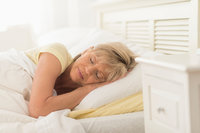Pavilion Publishing and Media Ltd
Blue Sky Offices Shoreham, 25 Cecil Pashley Way, Shoreham-by-Sea, West Sussex, BN43 5FF, UNITED KINGDOM
 Older people sleep less, but experience better quality sleep and feel more awake during the day, new research into the effects of age on sleep has suggested.
Older people sleep less, but experience better quality sleep and feel more awake during the day, new research into the effects of age on sleep has suggested.
The study aimed to understand how sleep changes across age and gender. It is used as a biomarker for general health and pathological conditions, but changes across age and gender are poorly understood.
Researchers from the University of Lausanne, Switzerland, looked to fill this gap in sleep research in a recent paper published in Annals of Medicine.
The study, led by researcher Gianina Luca, used a mixture of subjective and objective evaluation of sleep, ranging from questionnaires to sleep study. This enabled the researchers to examine the physical differences in sleep and whether individuals of different ages interpreted their sleep quality differently.
In all, 6,733 participants took part, aged 35-75 years. These were all randomly selected between 2003 and 2006 from the adult general population of Lausanne. The researchers aimed to exclude any individuals who had declared sleep disorders, in order to focus their study on the sleep changes of healthy individuals over the years.
The study revealed that aging was associated with a gradual shift towards ‘morningness’, with the older population going to bed earlier and rising earlier than their younger counterparts. It was also observed that they slept for less time.
Despite this reduced sleep-time it was revealed that older people complain less about sleepiness, and “pathological sleepiness is significantly lower than younger subjects”. This suggests that older people require less sleep.
Sleep latency – the length of time it takes you to fall asleep at night – increased with age in women, but there was little change in men’s speed of getting to sleep. However, although older people were more restless during sleep and more likely to wake up than younger individuals, they reported better sleep quality and daytime functioning. Luca suggested this could be due to an “adaptation of expectations” about sleep, or an “acclimatisation to sleep changes”.
The research suggested that, although the quality of sleep may not improve as we age, we will be more satisfied with our sleep patterns and quality, feel less tired, and consequently will function better during the day. However, the research suggested that any sleep complaints in the elderly are not normal and should be investigated to identify the underlying cause.


